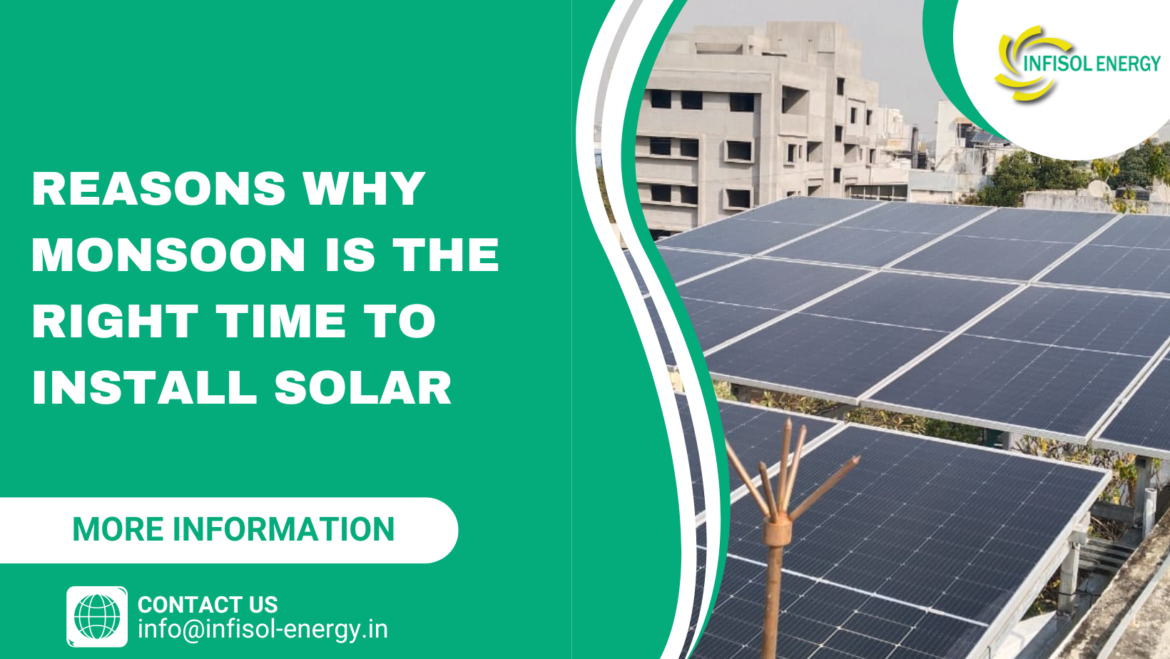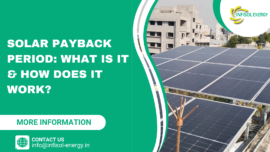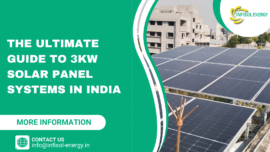You may think of sunshine and clear skies when you consider installing a solar panel or solar rooftop system. But what if we told you that the rainy season is actually the best time to get started?
It might sound surprising, but there are many reasons why installing solar during monsoon season can be a smart move. Let us discuss Why Monsoon is the Right Time to Install Solar systems.
Solar Panels Are Built to Handle rain
You may be afraid of rain effects on your panels. The good news is that they come with their built-in water resistance feature. To say that this makes them watertight is true and should make you worry less about these panels themselves.
However, you must monitor its mounting structure, which is made of rust-proof materials such as zinc-coated and galvanized steel and may be aluminum. These materials withstand elements, keeping your panels intact and free from rusting.
Monsoons Slow Down Power Generation, But Don’t Stop
Some people believe in the myth that solar panels do not work during rain. While it’s true that heavy rain can reduce power generation, it doesn’t stop it completely. Being able to absorb light instead of heat explains why it still generates electricity, even on cloudy or rainy days.
In addition, they will generate enough electricity in the summer to compensate for any lost time during the rainy season. In other words, that is an all-weather investment in solar energy.
Test the durability of your system
Monsoon winds can be strong, and you may consider postponing until the wet season is over. But if you install your solar rooftop system now, you can see its strength and durability.
Strong mounting structures will resist high winds, thus keeping your system intact. For example, some mounting structures are made to remain firm even when faced with cyclonic winds moving at 170 mph, bringing peace of mind in varied weather.
Avoid Rising Prices
The cost of on grid solar system installation usually rises with time. Installing your solar rooftop system during rainy seasons like now saves on future purchases.
Therefore, delaying it could lead to extra expenses associated with equipment and longer waits before the savings start reflecting on monthly power bills. At the same time, earlier interventions could be a financially intelligent move.
Rainfall Based Natural Cleaning
One thing about installing your solar panels during the rainy season could be clearer: rain naturally cleans these surfaces. Dust and dirt can clog up your solar panels, making them less effective, but this will be washed away by rainwater.
In other words, maintenance requires minimal effort for a more efficient panel. As such, it becomes possible to keep cleaning their panels without much ado since they always remain clean enough without too much infestation by fungal or algae spores thanks to reliable firms that offer after-sales services like ours for solar panel installations and repairs where you can ensure your panels are always in top condition.
The Installation Timeline
It may take around 15 to 20 days of work for local DISCOM confirmation. You could purchase everything you need for the installation, such as solar panels and inverters, during this time. It is also possible to plan your installation during gaps in the rain.
Once installed, your system will be ready to generate power, rain & shine. The entire process of technical approval, installation and meter change takes about the same time, regardless of the season.
Foundation Strength
The foundation of your solar panel system is made from concrete. Installing it during the rainy season can benefit the curing process.
Moreover, curing happens faster if it is done during rain. Rain helps naturally cure concrete, making it stronger than artificially cured foundations with a gain of over 30%. This additional power ensures that your system stays solid and long-lasting through the years.
Conclusion
As the world moves towards sustainable energy sources, solar power usage is increasing. Monsoons are an excellent time to make the switch to solar energy.
The rains help keep your solar panels clean, ensuring optimal performance without the need for manual cleaning. Additionally, installing solar panels during the monsoon season allows you to take advantage of current prices, which are likely to increase over time.
In Maharashtra, Infisol Energy LLP is your trusted partner in making this transition. Our expertise and dedication to quality make us the go-to solar company in the area. So, if you’re ready to experience the power of the sun and reduce your environmental impact and also save on energy costs, contact Infisol Energy LLP today.
FAQs
Can solar panels work during the monsoon season?
Yes, solar panels can produce electricity during the monsoon season; they absorb light but not heat, so they still work when it is cloudy or rainy.
Won’t the rain damage the solar panels?
No, solar panels are made to be waterproof and rainproof. Mount structures should prevent rusting to last for a long time.
Is it cheaper to install solar panels during the monsoon season?
Installing solar panels sooner rather than later will save you money because, as time goes on, the prices of solar components tend to increase.
Does rain help maintain the solar panels?
Certainly! Water from rain has a natural ability to clean off dust and dirt naturally from its surfaces. It keeps them operating efficiently.
How does the monsoon affect the installation timeline?
The installation timeline in monsoons is similar to other seasons, where approvals and procurement take time, and there are gaps between the rain used for installation.



